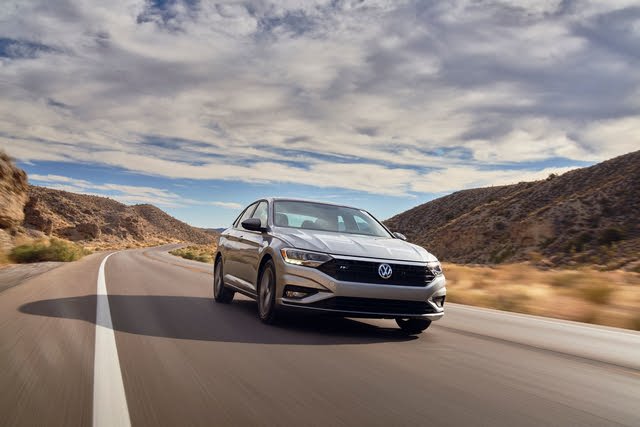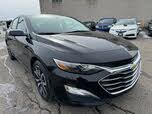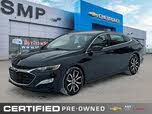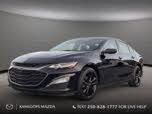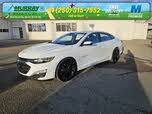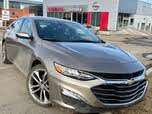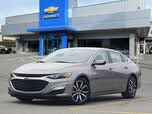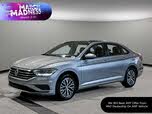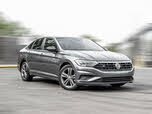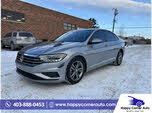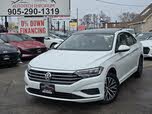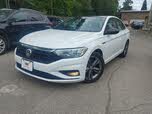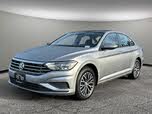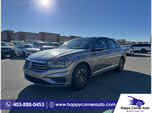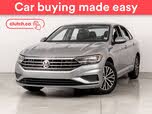2022 Chevrolet Malibu vs 2021 Volkswagen Jetta
Overview | ||
MSRP | $18,995 | $23,400 |
Average price | $22,899 | $23,056 |
Listings | ||
Ratings & Reviews | ||
User reviews | ||
Expert reviews | 8.0 out of 10Read full review | |
Pros & cons | ||
Summary | Small cars aren't asked to do much beyond the basics: provide efficient, reliable transportation at a manageable price. Plenty of models fit this form, and in some rare cases, they manage to do it while also being fun to drive, like the Mazda3. In other cases, the vehicle manages to feel more upscale than the competition, like the Honda Civic. But the Volkswagen Jetta's legacy has historically been defined by its ability to offer both an upscale interior and a rewarding driving experience. But then something happened with the Jetta. Starting with the 2011 model year, Volkswagen attempted to broaden the Jetta's appeal, and until 2018 we were left with a drab interior, an underpowered engine, and an uninspiring driving experience. VW’s hallmark was always that its cars felt a little special, so by adopting a homogenous look and feel, VW removed what made the Jetta unique and desirable to its fans. So Volkswagen had some work to do with the seventh-generation Jetta, which launched in 2019. Does this car move the Jetta name back toward driving refinement and upscale feel? Or does it continue to disappoint as just another bland entrant among small cars? | |
Video | No video found | No video found |
Popular Features & Specs | ||
Engine | 1.4L 147 hp I4 | 1.5L 160 hp I4 |
Drive Train | FWD | FWD |
Seating Capacity | 5 | 5 |
Horsepower | 147 hp @ 5000 rpm | 160 hp @ 5700 rpm |
MPG City | 29 | 29 |
MPG Highway | 39 | 36 |
Engine | ||
Engine Name | 1.4L 147 hp I4 | 1.5L 160 hp I4 |
Torque | 184 lb-ft @ 1400 rpm | 184 lb-ft @ 2500 rpm |
Horsepower | 147 hp @ 5000 rpm | 160 hp @ 5700 rpm |
Drivetrain | FWD | FWD |
Fuel Economy | ||
MPG City | 29 | 29 |
MPG Highway | 39 | 36 |
Interior | ||
Seating Capacity | 5 | 5 |
Safety | ||
Front Crash Overall | 4 | 5 |
Side Crash Overall | 5 | 4 |
Dimensions & Capacity | ||
Cargo Space | 14.1 cu ft | 15.7 cu ft |
Curb Weight | 2965 lbs | 3135 lbs |
Height | 57.6 in | 57.9 in |
Length | 185.1 in | 194.2 in |
Width | 70.8 in | 73.0 in |
Wheelbase | 105.7 in | 111.4 in |
Maximum Payload | 882 lbs | |
Number of doors | 4 | 4 |

By: CarGurus + AI
At CarGurus, our team of experienced automotive writers remain at the heart of our content operation, conducting hands-on car tests and writing insightful guides that are backed by years of industry experience. To complement this, we are harnessing AI to make our content offering more diverse and more helpful to shoppers than ever. To achieve this, our AI systems are based exclusively on CarGurus content, ratings and data, so that what we produce is both unique to CarGurus, and uniquely helpful to car shoppers.
